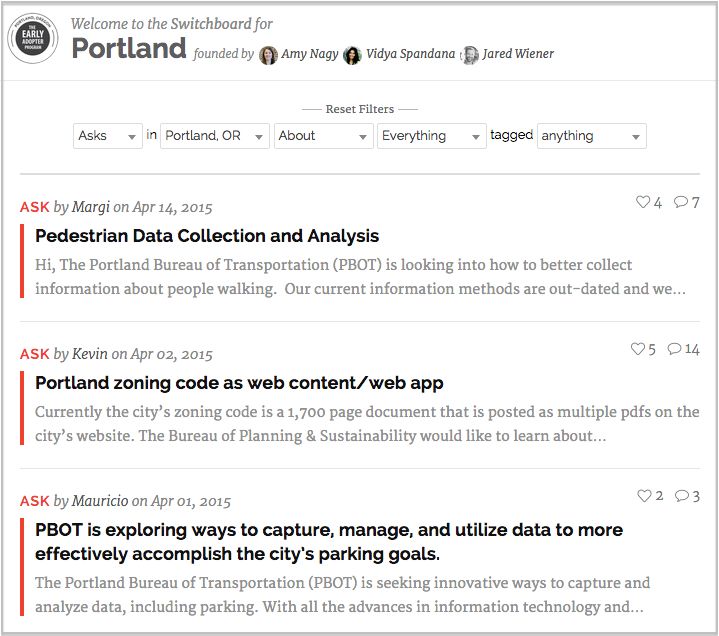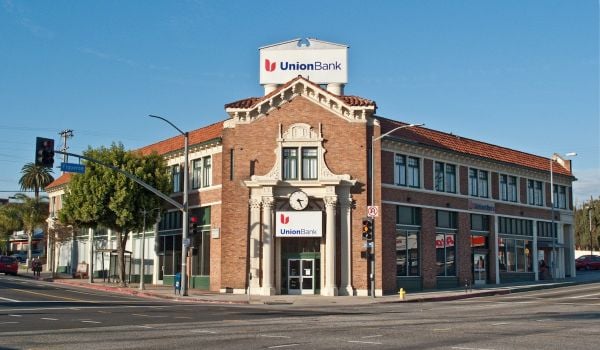When the Portland Development Commission considered shaking up traditional municipal RFPs two years ago, the city development agency hoped to be able to tap into the city’s early-stage, Portland, Oregon-based startups. Eschewing the customary wait-and-see approach to finding government product and service providers, the PDC decided to go directly to the local software industry and explain what different departments needed.
One product of the outreach effort was a mobile ticketing app developed by GlobeSherpa and currently in use by TriMet, the city bureau in charge of public transit in Portland. This was civic hacking in action: TriMet was interested in creating a mobile ticketing app, but didn’t know who the best provider would be.
“Sometimes these challenges are things government is already aware of, and they just don’t necessarily know what the right solution is,” says Jared Wiener, a project manager with the PDC. “So how can we institutionalize this so we can lower barriers in order to create more opportunities?”
The City of Portland’s answer to that question became the Portland-based Switchboard. Co-founded by Mara Zepeda and Sean Lerner in 2013, the startup builds simple websites that are crosses between Craigslist and the community-organizing site Neighborland. About a dozen universities, nonprofits and high schools across the U.S. use Switchboard. Portland is the first city government client.
On Switchboard, users write posts on a public wall that all Switchboard members can see, but those posts are limited to two categories: asks and offers. For the City of Portland, Switchboard is meant to be the place where different city bureaus can articulate exactly what they need and be matched with potential vendors who might be able to offer a relevant solution, long before a conventional request for proposal is issued by a city agency.

On Portland’s Switchboard, users on a public wall can makes asks and offers regarding developing city products and services.
“It’s a really simple idea where you basically strip out social sharing,” says Zepeda. “You cut right down to what a community needs and then you use the Internet to meet those needs.”
Since March, the City of Portland, as part of an early adopter program overseen by the PDC and supported by $80,000 from the city’s Innovation Fund, has been using Switchboard to facilitate the sorts of conversations that led to the creation of TriMet’s mobile ticketing app. The asks on Portland’s Switchboard, which has more than 130 members to date, are mostly people from city bureaus announcing what challenges or problems they need help solving; the offers come from members of the city’s startup scene building software that might be useful to city government.
“It allows you in a relatively easy way to filter through the noise and to get to what you’re really focused on,” Wiener says. “And for a more in-depth conversation, it really forces you to go offline. It’s a good mix of new technology and the tried and true method of ‘there’s nothing better than meeting somebody face to face.’”
While the platform is still in its infancy in Portland, already some promising results have emerged, Wiener says. He points to one conversation in which an employee of Knock Software was able to get in touch with the Portland Bureau of Transportation after posting a Switchboard offer of technology to help the city collect better data on public transportation use.
Wiener doesn’t see Switchboard eliminating the city’s typical RFP process. On the contrary, by creating a much more casual line of communication between the public and private sectors, he thinks the city will end up with a sharper RFP process.
“[Switchboard] does two things,” he says. “The city will get better results from our purchases, and the interaction that’s happened to allow [city bureaus] to get to that point will mean the [companies] they’ve interacted with will be more aware of what the opportunity is. It’s much harder when entrepreneurs and startups are looking at a procurement document and not knowing necessarily who that person is or what that opportunity is really about.”
As for taking Switchboard to other cities, Zepeda says the startup is “just beginning the scale-up process,” and is currently looking for other city governments interested in giving the platform a try. Annual subscriptions to the platform are how Switchboard pays its bills. (In Portland, $80,000 from the city’s Innovation Fund goes toward several of Portland’s Early Adopter initiatives, of which Switchboard is one.)
But Zepeda seems confident the basic idea of the platform she and Lerner have created will catch on. She cites the Hay Net website, created by the U.S. Department of Agriculture, to support her claim. On Hay Net, farmers post whether they need hay or have hay, and that’s it. Although Hay Net wasn’t the direct inspiration for Switchboard, Zepeda argues the underlying methodology for each website is the same.
“So much technology we use these days are attention economies. Pinterest and Facebook are profiting off of our time and attention,” she says. “What we desperately want are solution spaces. So the easiest way to do that is to give people a job to do.”
The Works is made possible with the support of the Surdna Foundation.


















